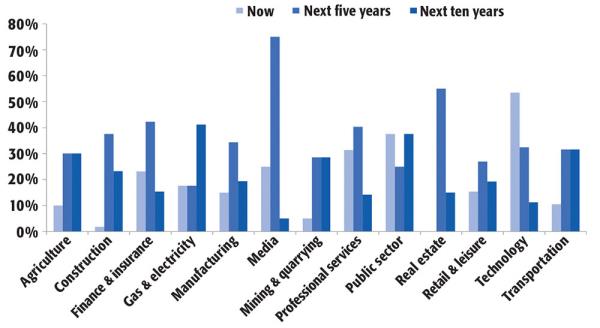29 November 2017
The top three technologies that are set to move from the fringes to the business mainstream over the next five years are artificial intelligence, blockchain and the IoT, according to the Confederation of British Industry (CBI).
In its Disrupting the Future report, it highlights how firms and the government must pave the way for the adoption of cutting-edge technologies in order to tackle the barriers that businesses are facing. The CBI says these include the skills shortages that 66 per cent of businesses lack when it comes to adopting AI technologies; the need for regulatory coordination of blockchain; and the security and privacy of devices deployed as part of the IoT.
“Artificial intelligence solves problems; blockchain changes how businesses exchange value; the Internet of Things unlocks big data,” says CBI DG Josh Hardie. “The UK must lead the way in adopting these technologies, but we must also prepare for their impacts.”
Hardie adds that these are no longer ideas on the fringes and are now “shifting rapidly” into the business mainstream.
As part of its Innovation survey carried out last year, the CBI found that half of business believe AI will fundamentally transform their industry/market. Twenty three per cent said it was already having an impact on their sector, while 37 per cent said it would have an impact on their sector in the next five years.

The graph illustrates business’ perceptions on when artificial intelligence will impact their sector. SOURCE: CBI, ADOPTING THE FUTURE SURVEY, 2017
In the same survey, 11 per cent also revealed that blockchain was already having an impact on their sector, while 27 per cent said it would do so in the next five years. The CBI describes blockchain as digital, encrypted exchanges that can be anything from the movement of data, goods or money. In practice, everyone in a blockchain network has access to the information about a transaction, and its verification is achieved by relevant users in the blockchain agreeing to the exchange.
Meanwhile, 54 per cent of businesses said the IoT was already having an impact on their sector, and 30 per cent expected it to do so in the next five years.
The CBI has set out proposals on how the government can help create the right environment for growing businesses to thrive and take advantage of the opportunities afforded by new technologies. It has called on Westminster to establish a joint commission in early 2018 involving businesses, employee representatives, academics and a minister, to examine the impact of AI on people and jobs. The confederation says action plans are needed that will raise productivity, spread prosperity and open up new paths to economic growth.
In terms of blockchain, the CBI says the technology spans different sectors and will require regulatory coordination at both a domestic and international level to avoid fragmentation and encourage industry collaboration. It says regulators should work closely with the different industry consortia and the Financial Conduct Authority to share best practice and learnings.
The CBI also points out that the GDPR sets a clear framework for safeguarding theinformation generated by devices. It says the priority for government should be passing the UK Data Protection Bill so firms have adequate time to prepare for the new rules.










